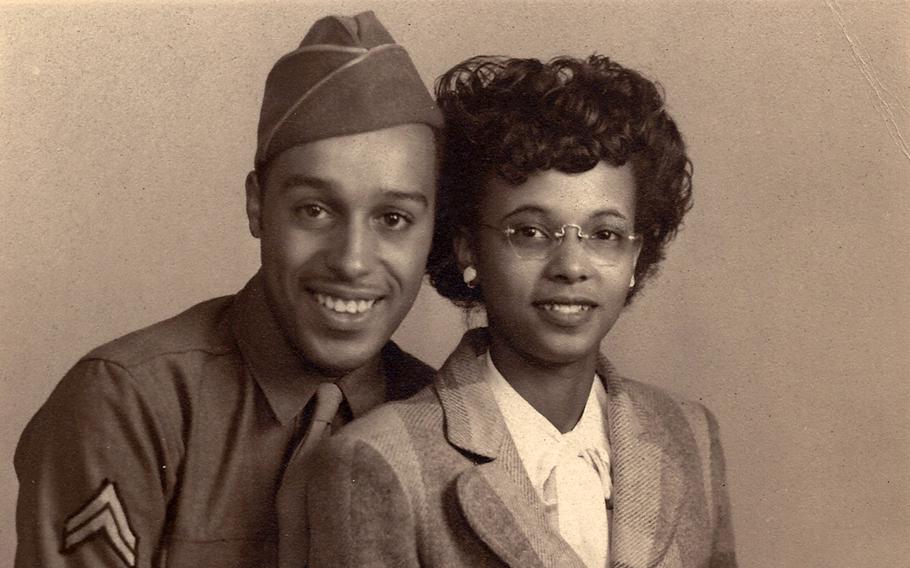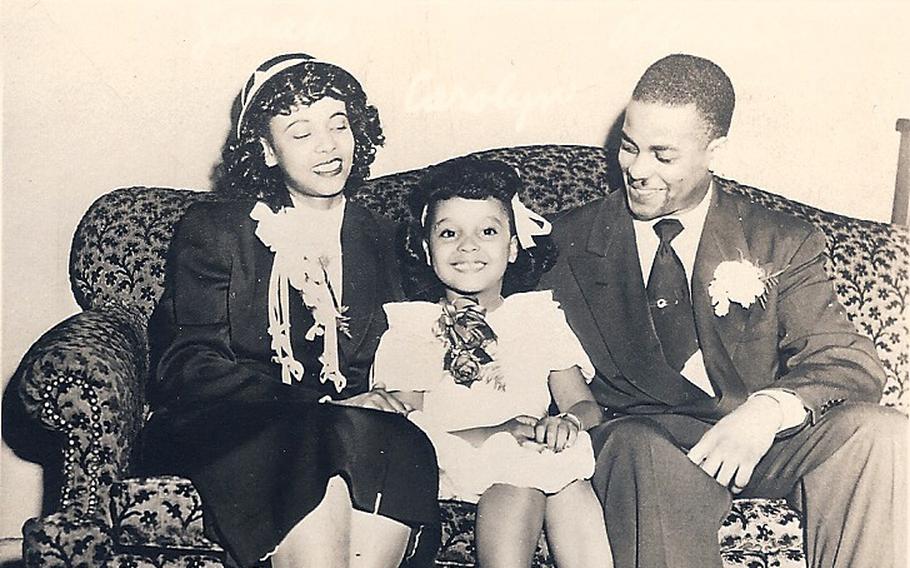
Allen Leftridge, pictured with wife Sarah Leftridge, was killed by a white soldier at the end of World War II. (Will Holman)
About two weeks after the end of World War II in Europe, French women were serving U.S. soldiers coffee and doughnuts in a Red Cross tent in France. Two Black soldiers went inside to get some.
This was a breach of norms: In a segregated Army, many white American soldiers did not want Black men talking to French women.
The Black soldiers — Allen Leftridge and Frank Glenn — were challenged by a white sergeant, according to a witness. When a white armed guard arrived, he fatally shot the two men. A third soldier — a white man just released from a German prison camp who was not named in documents related to the incident — was caught in the crossfire and killed, a newspaper from the time reported.
These deaths, briefly touched upon in a 1984 oral history, were not widely chronicled at the time beyond Black publications. Documents in the Library of Congress archives — including pleas from civil rights advocates and responses from military officials — reveal details of the case and further evidence of how white U.S. soldiers fighting fascism abroad brought racism overseas. The consequences were fatal — and some victims of racial violence were robbed of compensation.
Two white soldiers were acquitted in a court-martial over the deadly incident. Leftridge's widow was denied military benefits because her husband's death was ruled not in the line of duty "due to his own misconduct."
"They weren't breaking a law — unless there's a law against being a Negro soldier," a legal advocate for the slain Black soldiers wrote in 1946. "They were visiting a Red Cross tent — on the post on which they were stationed — and were shot down by trigger-happy guards who had prejudice[d] orders not to allow Negro soldiers to talk to French women."
"That's not how people think about World War II," said Matthew F. Delmont, Dartmouth University history professor and the author of a book about African American troops in World War II. "Incidents like these between Black and white troops really spotlight that things were not unified in any real way."
However, there may be a remedy. In another case from the same period, a Black soldier slain in a Jim Crow incident in Georgia was wrongly blamed for the circumstances that led to his death until his record was corrected last year. This didn't just clear his name, but may also make it possible for his family to receive financial benefits.
More than 80 years after World War II, some racial injustices endured by Black servicemen are finally being addressed.
A long-forgotten case
Most of what is known about Leftridge and Glenn comes from the reporting of Alfred A. Duckett, a Black war correspondent who served in Leftridge's regiment and later became a speechwriter for Martin Luther King Jr.
In an interview published in Studs Terkel's oral history "The Good War," Duckett, who died in 1984, said the regiment was stationed at Camp Lucky Strike in Saint-Valery-en-Caux, France, about 120 miles north of Paris.
These Black troops were charged with guarding German prisoners, Duckett told Terkel. But some white U.S. officials feared these Black men would engage in normal interactions with white Europeans.
"There was an almost psychotic terror on the part of white commanders that there would be a great deal of association with the white women," Duckett said. One white Army chaplain, he added, warned Europeans that Black soldiers had tails.
Leftridge and Glenn went on their doughnut mission in this charged environment. As they were being served, Duckett said, military police showed up. There are varying accounts of what happened next.
"When a white MP ordered him not to stand there talking to this woman, Allen turned his back on him," Duckett told Terkel. "He was shot in the back and killed."
In an undated statement from the Library of Congress archives, a witness, Solomon Johnson, said Leftridge and a sergeant "got into a hot discussion and suddenly came to blows." After the fight was broken up, Leftridge "took one step" toward a guard, who then fired on him, according to Johnson.
"He never gave the command 'Halt' or gave any warning," Johnson said. The Post could not locate or reach him for comment.
"When is all this going to stop?" the Pittsburgh Courier, once the nation's most widely circulated Black newspaper, wrote a few months after the incident. "Now that prisoners have been liberated from Nazi tyranny in Germany, when will we be freed of it in our own lines?"

Sarah Leftridge, with daughter Carolyn and second husband Alfred A. Duckett, who unsuccessfully fought to get her military benefits. (Will Holman)
Seeking justice for a war widow — and marrying her
After Leftridge's death, the lives of those he left behind changed irrevocably.
In a 10-page letter written the day before he died — a copy of which was provided by his family to The Post — Leftridge mused that he might have to stay in France for only three more months and asked about his infant daughter: "What is baby doing now? Can she say any words yet?"
The shooting also transformed Duckett's life — more so after a meeting with Leftridge's widow, Sarah, and the couple's daughter.
According to the account in Terkel's book, Duckett had heard that Sarah wanted more information about her husband's death, so he paid her a visit. He found her at home with a young girl — Leftridge's daughter, whom he hadn't lived to meet.
The war correspondent and war widow stayed up late talking. When "The Star-Spangled Banner" came on the radio at the programming day's end, Duckett said, Sarah turned it off. She couldn't bear to hear the national anthem.
"She was very bitter about what had been done to her husband, to herself, to her little girl," Duckett told Terkel. As their relationship developed, Duckett ended up marrying Sarah, and her daughter became his.
The Post reached out to Leftridge's family; Carolyn Holman, his daughter and Duckett's stepdaughter, declined to comment.
Her son William Holman — Leftridge's grandson — told The Post that because of his grandfather's death, his mother grew up without a "stable male figure" after Duckett and Leftridge divorced when she was 5.
For reasons that aren't clear, Frank Glenn's death was ruled in the line of duty, archived documents show, and his widow was awarded a "gratuity."
But Sarah's efforts to secure military benefits came to nothing. The documents, including her handwritten letters to what was then the Veterans Administration, show she was denied a widow's pension and a $300 gratuity because the Army attributed her husband's death "to his own misconduct."
In 1947, the Army denied Sarah's application to correct her late husband's record.
"Private Leftridge was killed … after he failed to heed the challenge of an armed guard," an Army official wrote to the NAACP, which had taken up Leftridge's cause.
A fight for fair compensation in a new century
In such incidents in which white soldiers killed Black colleagues, the battle to clear a victim's name can stretch decades. In one 1941 case, a white military police officer shot a Black soldier after he talked loudly on a bus. The surviving family of that soldier — Albert King — succeeded in correcting the subsequent "not in the line of duty" designation only in November.
"This finding reverses a decision that is as wrong today as it was 82 years ago," Margaret Burnham, founder of Northeastern University Law School's Civil Rights and Restorative Justice Project, which tracks such cases, wrote in an email. "It is never too late."
Attorneys for King's family — a trio of lawyers with military records from the firm Morgan Lewis — took the case pro bono to clear King's name. Now that King's record has been corrected, they're trying to determine what financial benefits, if any, are available to the family.
The idea that the armed forces will pay compensation to a slain soldier's family is "one of the fundamental transactions that occur when you join the military," said Chris Melendez, one of the attorneys. "He should have been taken care of."
It's not clear how much Sarah Leftridge would have received had the Army reversed course — or how much her heirs could receive now. A $300 gratuity in 1945 is worth about $4,900 today. Widows' pensions, meanwhile, may be worth thousands of dollars per year and continue until the widow's death. His grandmother died in 2009, William Holman said.
In a statement, spokeswoman Madison Bonzo said the Army "puts a high priority on honoring the legacy of all our Soldiers and their families, especially when there may be an error or injustice."
"The Army is standing by to assist the Leftridge family through the Army Board for Correction of Military Records at the Army Review Boards Agency, should they decide to submit a records correction request," the statement said.
Holman said he's looking into how to pursue the benefits that were denied to his grandmother, leaving her "destitute."
Charissa Threat, a history professor at Chapman University, said that paying benefits to Black men who died because of racism in military ranks must be part of the conversation about racial justice.
"This boils down to a question of reparations," she said. "It's reparations under a different name."
Duckett died without clearing Allen Leftridge's name and decades before talk of reparations revived. Even amid civil rights gains, he knew a storm was coming.
"We've come a long way," Duckett said. "But racism is just as alive today, maybe even more virulent."
Magda Jean-Louis contributed to this report.